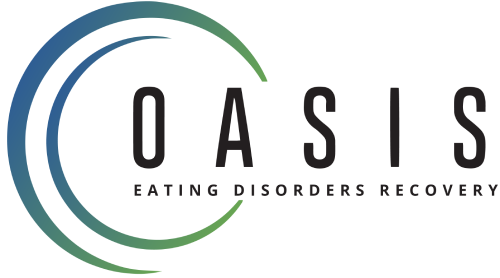Our IOP program provides comprehensive support and treatment for Transitional Age Youth (TAY) and adults with eating disorders, offering a structured and intensive approach to facilitate their recovery while allowing them to maintain their daily lives.
An Intensive Outpatient Program (IOP) for eating disorders is a structured treatment option designed for individuals who need more support than traditional outpatient therapy but do not require full-time residential or partial hospitalization care. IOPs provide a flexible yet intensive approach to recovery, allowing individuals to continue their daily responsibilities, such as work, school, or family commitments while receiving specialized treatment for their eating disorder.
At Oasis Eating Recovery, our IOP for eating disorders includes a combination of evidence-based therapies, group support, and nutritional guidance to help individuals develop healthier relationships with food and their bodies. This level of care is ideal for those transitioning from higher levels of treatment or those who need structured support to prevent worsening symptoms. By participating in an IOP, individuals can engage in treatment while gradually applying new coping skills in their daily lives, making it an essential step toward long-term recovery.
At Oasis Eating Recovery, our Intensive Outpatient Program (IOP) for Eating Disorders offers a well-rounded and evidence-based approach to healing. Our program is designed to provide structured support while allowing individuals to maintain their daily routines. Below is a detailed summary of the key components included in our IOP.
A crucial part of recovery from an eating disorder is restoring a healthy relationship with food. Each patient receives a customized meal plan developed by a registered dietitian to meet their nutritional needs while addressing any fears or anxieties around eating. Patients also participate in supervised meals, ensuring they receive adequate nutrition in a supportive, judgment-free environment while learning how to regulate food intake without restrictive or binge behaviors.
Understanding the role of nutrition in physical and mental health is essential for recovery. Our nutrition education groups provide evidence-based knowledge about balanced eating, the effects of malnutrition, and how food impacts mood and energy levels. These sessions help individuals challenge disordered thoughts about food, debunk myths surrounding dieting, and cultivate sustainable, healthy eating habits.
Negative body image is a common struggle for individuals with eating disorders. Our body image groups focus on developing a healthier self-perception and reducing body dissatisfaction. Through guided discussions, activities, and therapeutic techniques, patients learn to challenge societal beauty standards, develop self-compassion, and embrace body diversity.
Cognitive Behavioral Therapy (CBT) is a gold-standard treatment for eating disorders, helping individuals recognize and reframe negative thought patterns that drive disordered eating behaviors. In our CBT groups, patients work on identifying harmful beliefs, developing coping mechanisms, and practicing healthier responses to food, body image concerns, and emotional distress.
Dialectical Behavioral Therapy (DBT) is particularly beneficial for individuals struggling with emotional regulation, impulsivity, and self-destructive behaviors related to their eating disorder. Our DBT groups teach patients mindfulness, distress tolerance, emotion regulation, and interpersonal effectiveness skills to help them manage triggers and develop healthier coping strategies.
Many individuals with eating disorders have a history of trauma that contributes to their symptoms. EMDR is a highly effective trauma-focused therapy that helps patients process and heal from past traumatic experiences. By targeting distressing memories and emotional pain, EMDR enables individuals to reduce triggers, improve emotional regulation, and develop healthier coping mechanisms.
Creative expression can be a powerful tool for emotional healing. In our art therapy sessions, individuals engage in painting, drawing, sculpting, and other creative activities to explore their emotions, reduce stress, and process complex feelings surrounding body image and self-worth. Art therapy provides an alternative method of communication and self-expression, allowing patients to gain insights into their recovery journey in a nonverbal and therapeutic way.
Exercise and movement are often complicated topics for individuals recovering from an eating disorder. Our body positive movement groups encourage joyful, intuitive movement that is free from guilt, shame, or a focus on weight loss. Activities may include yoga, gentle stretching, or mindful walking, helping individuals reconnect with their bodies in a non-punitive, self-affirming way.
Eating disorders do not exist in isolation; they often impact personal relationships and family dynamics. Our individual therapy sessions provide one-on-one support to address personal challenges, trauma, and co-occurring mental health concerns. Family therapy sessions focus on improving communication, fostering understanding, and strengthening the support system at home. By involving loved ones in the recovery process, we help create a more supportive and healing environment.
For patients who experience severe emotional distress or moments of crisis, we offer immediate crisis intervention support. Our team of clinicians is trained to help patients navigate intense emotions, urges to engage in disordered behaviors, or other psychological crises in a safe and compassionate manner. We provide coping tools, emotional regulation strategies, and 24/7 support when necessary to ensure patient safety.
Recovery doesn’t end when the IOP program is completed. Our case management and aftercare planning services help individuals transition to the next stage of their recovery journey. We assist with finding outpatient therapists, dietitians, support groups, and other resources that will help maintain long-term progress. Patients receive an individualized aftercare plan that ensures they have continued support, accountability, and access to recovery resources beyond their time in our program.
Choosing between a Partial Hospitalization Program (PHP) and an Intensive Outpatient Program (IOP) depends on several factors, including the severity of your eating disorder, level of medical and emotional support needed, and ability to function independently in daily life. At Oasis Eating Recovery, we conduct thorough assessments to determine the most appropriate programs and services for each individual.
At Oasis Eating Recovery, our Intensive Outpatient Program (IOP) is designed to help you build lasting recovery, regain confidence in your eating habits, and develop a healthier relationship with food and your body—all while maintaining your daily routine.
We know that asking for help takes courage. Getting in touch is the first step. We’re here for you, no matter what. Once submitted, our admissions team will be in touch within 24 hours.
Or call us directly to get started: (559) 245-6203
Connect with our admissions team over the phone for a confidential conversation to understand your needs and goals.
Together, we’ll determine the level of care that best supports your recovery journey.
We create a comprehensive treatment plan to ensure continued healing and support with group therapy, nutrition, body image groups, individual/family sessions.
If you or a loved one is struggling with an eating disorder, you don’t have to face it alone. At Oasis Eating Recovery, our Intensive Outpatient Program (IOP) provides the structured support, expert care, and compassionate guidance you need to regain control of your life and build a healthier relationship with food and your body.
Recovery is possible, and it starts with one step. Contact us today to speak with our admissions team, verify your insurance, and schedule a confidential assessment.

At Oasis Eating Recovery, our IOP typically requires 3-5 hours of treatment per day, 3-5 days per week. The exact schedule varies depending on individual needs, but the program is designed to provide structured support while allowing flexibility for other daily responsibilities.
Many insurance plans cover Intensive Outpatient Programs for eating disorders, but coverage varies based on your provider and plan. We offer insurance verification and financial consultations to help you understand your benefits and determine the best options for your treatment. We accept most major insurance providers, and our team will guide you through the process to minimize financial stress.
If you’re questioning whether you need treatment, it’s a strong sign that support may be beneficial. Many individuals with eating disorders struggle to recognize the severity of their condition, but seeking early-intervention can prevent symptoms from worsening. If you experience anxiety around food, compulsive eating behaviors, or body image distress that interferes with daily life, reaching out for a professional evaluation can help you determine the best path forward.
We understand that seeking treatment is time-sensitive, and we strive to admit new patients as quickly as possible. In most cases, individuals can begin IOP within a few days of their initial assessment. If there is a waitlist, our team will work with you to provide immediate resources and support until you can begin treatment.
While IOP provides structured care during treatment hours, we also equip our patients with coping strategies, crisis intervention planning, and after-hours resources to help them navigate recovery outside of the program. If additional support is needed, we assist in connecting patients with outpatient therapists, support groups, or a step-up in care if necessary.
The first step is to contact Oasis Eating Recovery for an initial assessment and consultation. Our team will review your medical and psychological history, discuss your treatment goals, and determine if IOP is the best fit for your needs. We are here to guide you through every step of the process.

I will be back soon